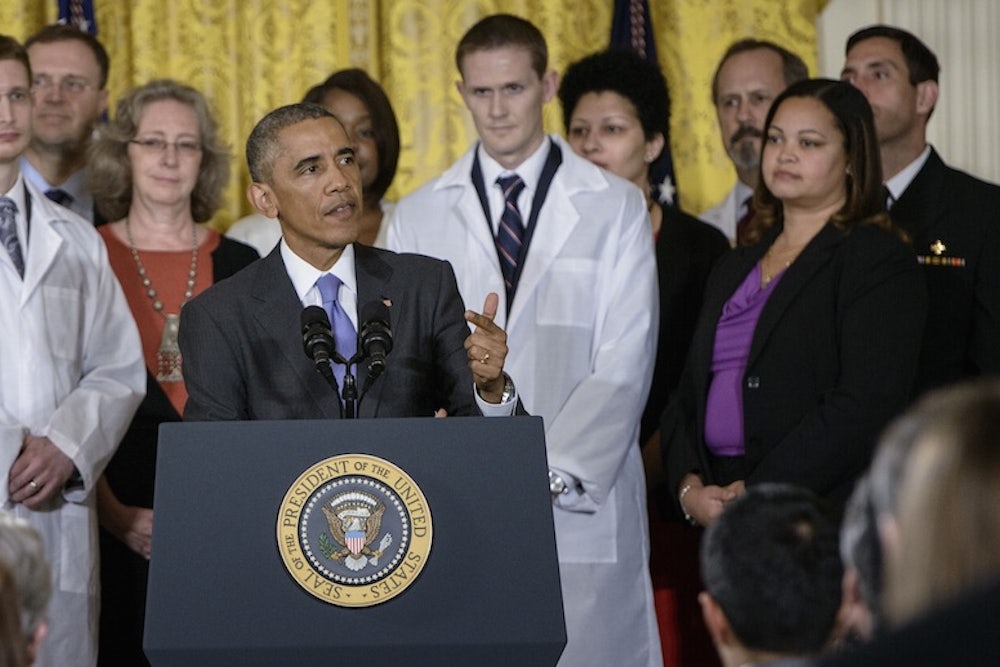One of my colleagues is ill with Ebola that he contracted while working in West Africa for Medicines Sans Frontiers, otherwise known as Doctors Without Borders. Dr. Craig Spencer is having a hard enough time fighting the disease, but it’s only been made worse for him and his family by the criticism and outrage that was heaped upon him by the press, including The New Republic. It has sent a chill through other MSF field workers, whose job is challenging enough without the added burden of facing similar treatment upon return home.
It is neither fair nor accurate to accuse Dr. Spencer of moral failings for not quarantining himself on his return. He did not run about New York while "sick," as Julia Ioffe contends, and did not put people in danger. As has been made clear since the beginning of the outbreak, only people with symptoms can transmit Ebola. At the first sign of illness—a fever on October 23, when he still would have represented only a minimal risk of contagion—he contacted the MSF office, which then alerted city health authorities. He was then taken directly to Bellevue Hospital, well before he posed a threat to the public.
Armchair physicians note that a couple days before this, Dr. Spencer was feeling "sluggish." This is not the onset of Ebola, this is the normal condition of those who have been working around the clock for weeks in a stressful setting prior to travel across several time zones. Nor should one read into his abstaining from work a need to protect his patients. He needed rest. MSF advises all aid workers back from the field to get rest before going back to work, and it goes further with people working in Ebola projects, mandating that they not return to work for three weeks to reduce their exposure to sick people from whom they might catch something that might be confused with Ebola and cause unnecessary alarm.
Howard Markel implies that Spencer presumed he would never get Ebola and therefore took a risk with himself and others. MSF does not send people like that to the field. Everyone who departs on an Ebola mission with MSF is made very aware of the risks involved and how to manage them. What’s more, Dr. Spencer worked with a team that had seen people dying from Ebola every day, and this includes MSF staff. MSF has lost thirteen staff members during this outbreak, and two international staff members like Dr. Spencer had to be evacuated from the field after contracting Ebola. No one who works for MSF in the field thinks Ebola could not happen to them or is unaware of its risks to others. No one.
Noam Scheiber is mistaken in writing that "it’s become our policy in this country to quarantine anyone who had direct contact with an Ebola patient." This was not federal or state policy when Scheiber wrote his story, nor is it MSF policy. If the public feels that things should have been done differently, they should direct their complaints at MSF, not at Dr. Spencer. We are happy and ready to have this conversation. MSF have been bringing people back from Ebola outbreaks for almost 20 years, and we have an evidence-based policy for how they should protect the public on their return; it does not involve self-quarantine. The World Health Organization does not mandate quarantine for their staff, either. Nor does the CDC feel this is warranted. Only now, after Dr. Spencer’s diagnosis and the excessive reaction to it, are some states beginning to require this, even though public health experts know this is a bad idea. Our colleague Kaci Hickox had the misfortune of arriving back in the U.S. just as the new quarantine requirement was announced, and her haphazard and harsh treatment will not be encouraging to others.
Thus far, MSF has had great fortune finding people willing to go to West Africa to fight Ebola. They have set aside fears, reassured their families, and obtained leave from their ordinary responsibilities to join us. This speaks to the character and commitment of the people who work with us—people like Dr. Spencer and Kaci Hickox. If they are discouraged by the prospect of three weeks of near total isolation on their return, we may lose the services of many good people. That will damage the effort to counter the outbreak at its epicenter, which remains the best way to protect the public at large, in any country.
Correction: A previous version of this article misspelled Médecins Sans Frontières.
